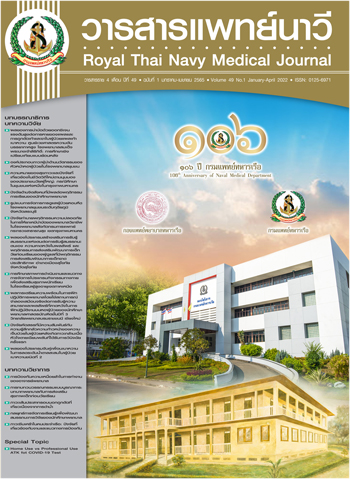การศึกษาสภาพการดำเนินงานและแนวทางการจัดการโปรแกรมกิจกรรมทางกายเพื่อส่งเสริมสุขภาพนักเรียน ในโรงเรียนผู้สูงอายุเขตภาคเหนือ
Main Article Content
บทคัดย่อ
การวิจัยครั้งนี้มีวัตถุประสงค์เพื่อศึกษาสภาพการดำเนินงานและแนวทางการจัดการโปรแกรมกิจกรรมทางกายเพื่อส่งเสริมสุขภาพนักเรียนในโรงเรียนผู้สูงอายุเขตภาคเหนือ วิธีดำเนินการวิจัยขั้นตอนที่ 1 การศึกษาสภาพการดำเนินงาน กลุ่มตัวอย่างเป็นคณะกรรมการโรงเรียนผู้สูงอายุ 23 แห่ง จำนวน 388 คน ขั้นตอนที่ 2 การศึกษาแนวทางการจัดการโปรแกรมกิจกรรมทางกายเพื่อส่งเสริมสุขภาพนักเรียนในโรงเรียนผู้สูงอายุ กลุ่มตัวอย่างเป็นคณะกรรมการโรงเรียนผู้สูงอายุจากโรงเรียนผู้สูงวัยพลายชุมพล เทศบาลตำบลพลายชุมพล จังหวัดพิษณุโลก จำนวน 16 คน เครื่องมือที่ใช้ในการเก็บข้อมูล ประกอบด้วย แบบสอบถามและแบบการสัมภาษณ์กลุ่ม วิเคราะห์ข้อมูลทางสถิติโดยทำการหาค่าร้อยละ ค่าเฉลี่ย ส่วนเบี่ยงเบนมาตรฐาน และการวิเคราะห์เนื้อหา
ผลการวิจัย พบว่า สภาพการดำเนินงานการจัดการโปรแกรมกิจกรรมทางกายเพื่อส่งเสริมสุขภาพนักเรียนในโรงเรียนผู้สูงอายุเขตภาคเหนือ ในด้านการจัดการตามหลักการจัดการ (POLE) คือ การวางแผน (Planning) การจัดองค์กร (Organizing) การนำ (Leading) และการประเมินผล (Evaluating) ด้านทรัพยากรในการบริหารจัดการ และด้านการจัดกิจกรรมทางกายนักเรียนผู้สูงอายุแบบมีส่วนร่วม มีสภาพการดำเนินงานอยู่ในระดับมาก (M = 3.58, SD = 0.47) และด้านรูปแบบโปรแกรมกิจกรรมทางกายสำหรับนักเรียนผู้สูงอายุ มีสภาพการดำเนินงานอยู่ในระดับปานกลาง (M = 2.88, SD = 0.40) และแนวทางการจัดการโปรแกรมกิจกรรมทางกายเพื่อส่งเสริมสุขภาพนักเรียนในโรงเรียนผู้สูงอายุ ควรประกอบด้วย 1) ทรัพยากรในการบริหารจัดการ คือ บุคลากร งบประมาณ วัสดุ อุปกรณ์ และสถานที่ 2) รูปแบบโปรแกรมกิจกรรมทางกายสำหรับนักเรียนผู้สูงอายุ 3) การจัดกิจกรรมทางกายนักเรียนผู้สูงอายุแบบมีส่วนร่วม และ 4) การจัดการ ซึ่งประกอบด้วย การวางแผน (Planning) การจัดองค์กร (Organizing) การนำ (Leading) และการประเมินผล (Evaluating) จากผลการวิจัยนี้แสดงให้เห็นว่า โรงเรียนผู้สูงอายุควรนำโปรแกรมกิจกรรมทางกายฯ ไปประยุกต์ใช้ในบริบทของแต่ละพื้นที่ เพิ่มบทบาทขององค์กรปกครองส่วนท้องถิ่นในการจัดการ และการพัฒนาผู้นำกิจกรรมทางกายในพื้นที่ เพื่อเป็นประโยชน์กับโรงเรียนผู้สูงอายุในการนำผลวิจัยด้านแนวทางในการจัดการโปรแกรมกิจกรรมทางกายเพื่อส่งเสริมสุขภาพนักเรียนไปใช้ในโรงเรียนผู้สูงอายุต่อไป
Article Details

อนุญาตภายใต้เงื่อนไข Creative Commons Attribution-NonCommercial-NoDerivatives 4.0 International License.
เอกสารอ้างอิง
Statistical Forecasting Bureau, National Statistical Office. The 2014 survey of the older persons in Thailand. Bangkok: Text and Journal Publication; 2014. (in Thai).
Department of Older Persons and the Ministry of Social Development and Human Security. School Handbook for the Elderly 2016. [Internet]. [cited 2020 September 16 ]. Available from: https://www.dop.go.th/th/know/5/24. (in Thai).
Arsantia J, Pomthong R. Trends in care of the elderly in the 21st century: challenges in nursing. Journal of the Royal Thai Army Nurses 2018;19(1):40. (in Thai).
Ministry of Tourism and Sports. National sports development plan No. 6 (2017 - 2021) Bangkok: Office of the Veterans Organization Printing House; 2017. (in Thai).
Webber SC, Porter MM, Menec VH. Mobility in older adults: a comprehensive framework; Gerontologist 2010;50(4):443-50.
Nakorn K, Purakom, A. International movement: principles and guidelines for organizing physical activities for health. Journal of Health Education, Physical Education and Recreation 2011;37(3):71-6. (in Thai).
The Committee Drafted a Master Plan for the Promotion of Physical Activities. Master plan to promote physical activities 2018 - 2030. [Internet]. [cited 2020 July 19]. Available from: https://planning.anamai.moph.go.th/download/D_DataMarts/PH_ACT/Master-Plan-for-Promoting-National-Physical-Activity.pdf. (in Thai).
Department of Elderly Affairs. Handbook of the elderly school 2016. Bangkok: Ministry of Social Development and Human Security; 2016. (in Thai).
Soponthamrak A. The seniors' school turns old people into social power. Thai Post [Internet]. 2018 January 29. [cited 2018 November 24]. Available from: http://www.thaihealth.or.th/Content/40528- Senior School% 20 turn the old man% 20 into a social force. html. (in Thai).
Khruthakul K. Handbook for the promotion of physical activity and physical fitness promotion of the elderly (Officer and caretaker version). Mahidol University; 2018. [Internet]. [cited 2020 August 12]. Available from: https://dol.thaihealth.or.th/Media/Index/5888f3e8-59f0-e711-80e3-00155d65ec2e.
Chelladurai P. Managing organization for sport and physical activity: a systems perspective. California: Hol-Comp Hathaway; 2009.
Mull RF, Bayless KG, Ross CM, Jamieson LM. Recreational sport management. 3rd ed. IL: Human Kinetics Publishers; 1997.
Oakley P, Marsden D. Approaches to participation in rural development. Geneva: International Labour Office for the ACC Task Force on Rural Development; 1984.
American College of Sports Medicine. ACSM’s guidelines for exercise testing and prescription. 6th ed. Philadelphia: Lippincott Williams and Wilkins; 2015.
Cochran WG. Sampling techniques. 2nd ed. New York: Wiley; 1977.
Wittayudom W. Modern management. Bangkok: Thanat Publication; 2015; (in Thai).
Thangkratok P, Petchsuk R, Keinwong T. Care management model for older adults with chronic diseases in the community. Royal Thai Navy Medical Journal 2020;47(1):234-48. (in Thai).
Inawarajong W. Influence of human resource practice on performance of instructor personnel in higher education institutions. [Doctoral Dissertation, Graduate School of Public Administration]. National Institute of Development Administration; 2009. (in Thai).
Ponguampai P, Hoontrakul S, Roojanavech S. The effects of family empowerment program on fall prevention capabilities of the elderly. Royal Thai Navy Medical Journal 2018;45(2):311-27. (in Thai).

